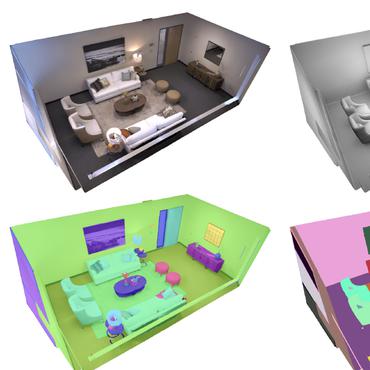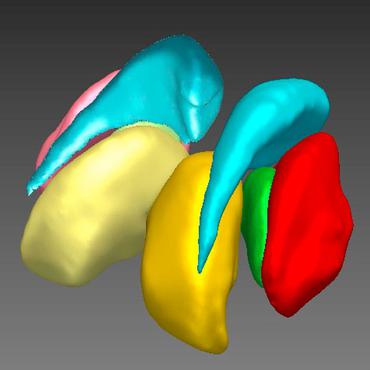Search Results for author: Richard Shaw
Found 13 papers, 1 papers with code
RoGUENeRF: A Robust Geometry-Consistent Universal Enhancer for NeRF
no code implementations • 18 Mar 2024 • Sibi Catley-Chandar, Richard Shaw, Gregory Slabaugh, Eduardo Perez-Pellitero
Conversely, existing 3D enhancers are able to transfer detail from nearby training images in a generalizable manner, but suffer from inaccurate camera calibration and can propagate errors from the geometry into rendered images.
SWAGS: Sampling Windows Adaptively for Dynamic 3D Gaussian Splatting
no code implementations • 20 Dec 2023 • Richard Shaw, Jifei Song, Arthur Moreau, Michal Nazarczuk, Sibi Catley-Chandar, Helisa Dhamo, Eduardo Perez-Pellitero
We model the dynamics of a scene using a tunable MLP, which learns the deformation field from a canonical space to a set of 3D Gaussians per frame.
HeadGaS: Real-Time Animatable Head Avatars via 3D Gaussian Splatting
no code implementations • 5 Dec 2023 • Helisa Dhamo, Yinyu Nie, Arthur Moreau, Jifei Song, Richard Shaw, Yiren Zhou, Eduardo Pérez-Pellitero
3D head animation has seen major quality and runtime improvements over the last few years, particularly empowered by the advances in differentiable rendering and neural radiance fields.
Human Gaussian Splatting: Real-time Rendering of Animatable Avatars
1 code implementation • 28 Nov 2023 • Arthur Moreau, Jifei Song, Helisa Dhamo, Richard Shaw, Yiren Zhou, Eduardo Pérez-Pellitero
This work addresses the problem of real-time rendering of photorealistic human body avatars learned from multi-view videos.
NTIRE 2022 Challenge on High Dynamic Range Imaging: Methods and Results
no code implementations • 25 May 2022 • Eduardo Pérez-Pellitero, Sibi Catley-Chandar, Richard Shaw, Aleš Leonardis, Radu Timofte, Zexin Zhang, Cen Liu, Yunbo Peng, Yue Lin, Gaocheng Yu, Jin Zhang, Zhe Ma, Hongbin Wang, Xiangyu Chen, Xintao Wang, Haiwei Wu, Lin Liu, Chao Dong, Jiantao Zhou, Qingsen Yan, Song Zhang, Weiye Chen, Yuhang Liu, Zhen Zhang, Yanning Zhang, Javen Qinfeng Shi, Dong Gong, Dan Zhu, Mengdi Sun, Guannan Chen, Yang Hu, Haowei Li, Baozhu Zou, Zhen Liu, Wenjie Lin, Ting Jiang, Chengzhi Jiang, Xinpeng Li, Mingyan Han, Haoqiang Fan, Jian Sun, Shuaicheng Liu, Juan Marín-Vega, Michael Sloth, Peter Schneider-Kamp, Richard Röttger, Chunyang Li, Long Bao, Gang He, Ziyao Xu, Li Xu, Gen Zhan, Ming Sun, Xing Wen, Junlin Li, Shuang Feng, Fei Lei, Rui Liu, Junxiang Ruan, Tianhong Dai, Wei Li, Zhan Lu, Hengyan Liu, Peian Huang, Guangyu Ren, Yonglin Luo, Chang Liu, Qiang Tu, Fangya Li, Ruipeng Gang, Chenghua Li, Jinjing Li, Sai Ma, Chenming Liu, Yizhen Cao, Steven Tel, Barthelemy Heyrman, Dominique Ginhac, Chul Lee, Gahyeon Kim, Seonghyun Park, An Gia Vien, Truong Thanh Nhat Mai, Howoon Yoon, Tu Vo, Alexander Holston, Sheir Zaheer, Chan Y. Park
The challenge is composed of two tracks with an emphasis on fidelity and complexity constraints: In Track 1, participants are asked to optimize objective fidelity scores while imposing a low-complexity constraint (i. e. solutions can not exceed a given number of operations).
HDR Reconstruction from Bracketed Exposures and Events
no code implementations • 28 Mar 2022 • Richard Shaw, Sibi Catley-Chandar, Ales Leonardis, Eduardo Perez-Pellitero
Our proposed approach surpasses SoTA multi-frame HDR reconstruction methods using synthetic and real events, with a 2dB and 1dB improvement in PSNR-L and PSNR-mu on the HdM HDR dataset, respectively.
Acquisition-invariant brain MRI segmentation with informative uncertainties
no code implementations • 7 Nov 2021 • Pedro Borges, Richard Shaw, Thomas Varsavsky, Kerstin Klaser, David Thomas, Ivana Drobnjak, Sebastien Ourselin, M Jorge Cardoso
Combining multi-site data can strengthen and uncover trends, but is a task that is marred by the influence of site-specific covariates that can bias the data and therefore any downstream analyses.
The role of MRI physics in brain segmentation CNNs: achieving acquisition invariance and instructive uncertainties
no code implementations • 4 Nov 2021 • Pedro Borges, Richard Shaw, Thomas Varsavsky, Kerstin Klaser, David Thomas, Ivana Drobnjak, Sebastien Ourselin, M Jorge Cardoso
Being able to adequately process and combine data arising from different sites is crucial in neuroimaging, but is difficult, owing to site, sequence and acquisition-parameter dependent biases.
A Decoupled Uncertainty Model for MRI Segmentation Quality Estimation
no code implementations • 6 Sep 2021 • Richard Shaw, Carole H. Sudre, Sebastien Ourselin, M. Jorge Cardoso, Hugh G. Pemberton
We aim to automate the process using a probabilistic network that estimates segmentation uncertainty through a heteroscedastic noise model, providing a measure of task-specific quality.
Estimating MRI Image Quality via Image Reconstruction Uncertainty
no code implementations • 21 Jun 2021 • Richard Shaw, Carole H. Sudre, Sebastien Ourselin, M. Jorge Cardoso
Thus, we argue that quality control for visual assessment cannot be equated to quality control for algorithmic processing.
Neuromorphologicaly-preserving Volumetric data encoding using VQ-VAE
no code implementations • MIDL 2019 • Petru-Daniel Tudosiu, Thomas Varsavsky, Richard Shaw, Mark Graham, Parashkev Nachev, Sebastien Ourselin, Carole H. Sudre, M. Jorge Cardoso
The increasing efficiency and compactness of deep learning architectures, together with hardware improvements, have enabled the complex and high-dimensional modelling of medical volumetric data at higher resolutions.
A Heteroscedastic Uncertainty Model for Decoupling Sources of MRI Image Quality
no code implementations • MIDL 2019 • Richard Shaw, Carole H. Sudre, Sebastien Ourselin, M. Jorge Cardoso
By augmenting the training data with different types of simulated k-space artefacts, we propose a novel cascading CNN architecture based on a student-teacher framework to decouple sources of uncertainty related to different k-space augmentations in an entirely self-supervised manner.
Question Answering Against Very-Large Text Collections
no code implementations • 26 Apr 2013 • Leon Derczynski, Richard Shaw, Ben Solway, Jun Wang
Question answering involves developing methods to extract useful information from large collections of documents.





